1.3 Unit 1 Helping those in need Grammar(课件)
文档属性
| 名称 | 1.3 Unit 1 Helping those in need Grammar(课件) | 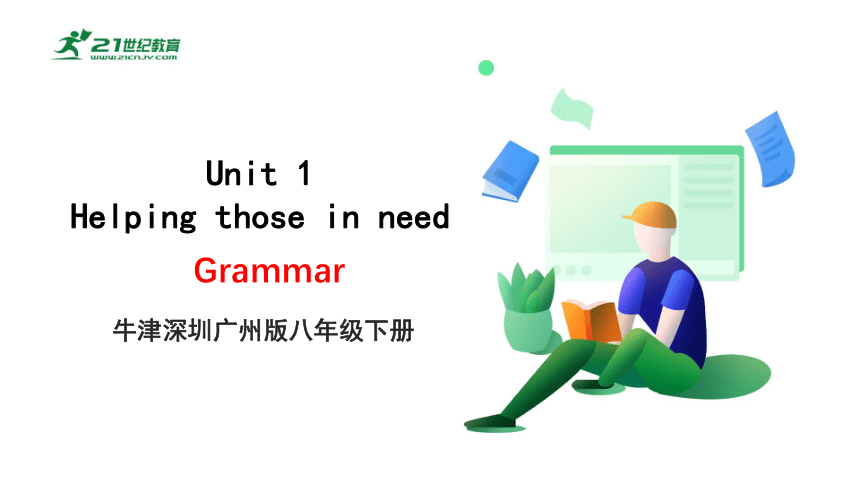 | |
| 格式 | pptx | ||
| 文件大小 | 6.2MB | ||
| 资源类型 | 试卷 | ||
| 版本资源 | 牛津深圳版 | ||
| 科目 | 英语 | ||
| 更新时间 | 2022-12-16 10:42:21 | ||
图片预览

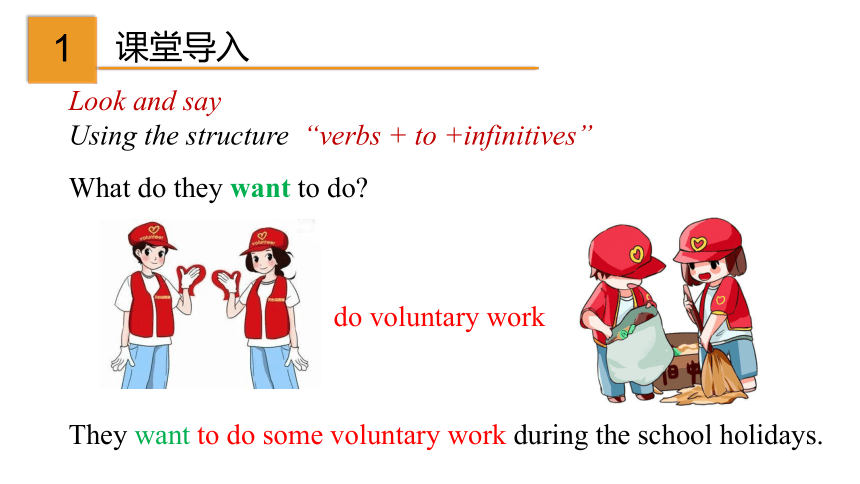



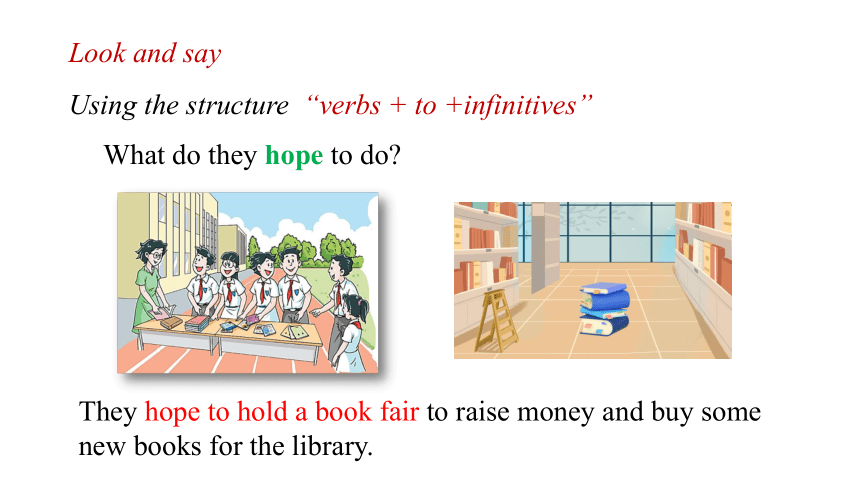

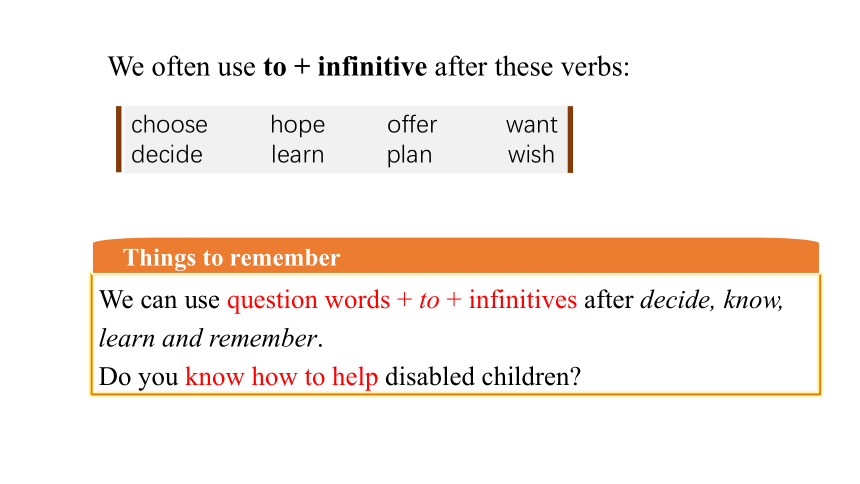


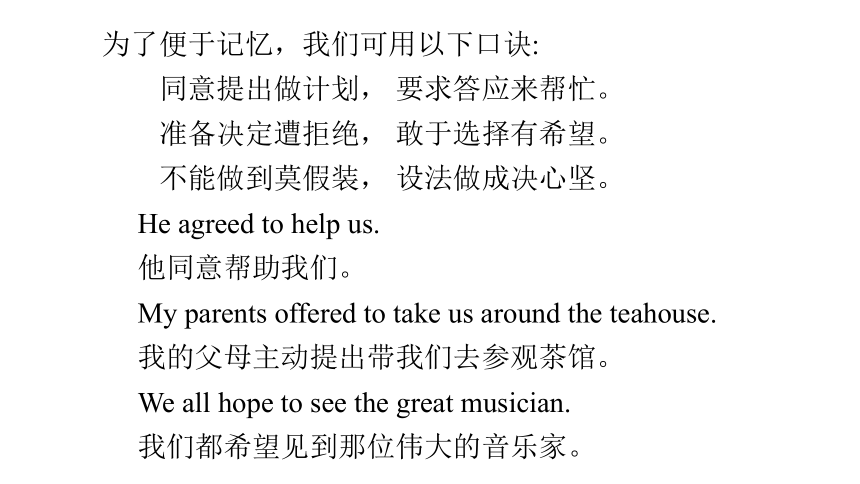

文档简介
(共30张PPT)
Unit 1
Helping those in need
牛津深圳广州版八年级下册
Grammar
Look and say
Using the structure “verbs + to +infinitives”
What do they want to do
They want to do some voluntary work during the school holidays.
do voluntary work
1
课堂导入
Look and say
Using the structure “verbs + to +infinitives”
What do they plan to do
They plan to raise money to help people in need.
Look and say
Using the structure “verbs + to +infinitives”
They offer to help the disabled people.
offer
What do they offer to do
Look and say
Using the structure “verbs + to +infinitives”
What do they decide to do
They decide to clean the park to make our city more beautiful .
Look and say
Using the structure “verbs + to +infinitives”
What do they hope to do
They hope to hold a book fair to raise money and buy some new books for the library.
Some verbs can have other verbs after them. We usually use to before the second verb. We call these second verbs infinitives.
Three teenagers offered to do some voluntary work during the school holidays.
Cindy wanted to paint a picture of the park near her home.
Work out the rule
An infinitive is the (base/ -ing/ -ed) form of a verb.
Infinitives
We can use verbs +to + infinitives in sentences.
2
课堂活动
choose hope offer want
decide learn plan wish
We often use to + infinitive after these verbs:
We can use question words + to + infinitives after decide, know,
learn and remember.
Do you know how to help disabled children
Things to remember
Infinitive
(不定式)
定义:
主要行为动词后面的动词都采用了”to+动词原形”的结构(有时可以不带to)。
(注:动词不定式没有人称和数的变化,在句子中不能做谓语。)
用法一:
不定式作宾语是及物动词后带to的不定式,表明意图、希望或决定的内容等。我们常见的动词+ to do sth. 的结构主要是动宾结构。
通常只能接不定式作宾语的动词有:agree (同意); offer (提出); intend, plan (打算,计划); demand, ask (要求); promise (答应); help (帮忙); prepare (准备); decide (决定); refuse (拒绝);dare (敢于); choose (选择); wish,hope,want, expect (希望,想要); fail ;(不能;忘记); pretend (假装); manage (设法); determine (决心)。
为了便于记忆,我们可用以下口诀:
同意提出做计划, 要求答应来帮忙。
准备决定遭拒绝, 敢于选择有希望。
不能做到莫假装, 设法做成决心坚。
He agreed to help us.
他同意帮助我们。
My parents offered to take us around the teahouse.
我的父母主动提出带我们去参观茶馆。
We all hope to see the great musician.
我们都希望见到那位伟大的音乐家。
特殊疑问词与不定式常连用作宾语,在功能上相当于一个宾语从句,但不能构成复合宾语。这些词为:know, decide, ask, forget, get, remember, like, learn, think, tell, want, wish, advise, show等。
I don’t know what to do.
我不知道该怎么办。
I haven’t decided how to go there.
我还没决定怎样去那里。
The map can show you where to go.
这张地图可以告诉你往哪走。
用法二:
We (1) ________________(decide/meet)Vivien today. We (2)
_____________(want/help) her in some way. When we arrived, Vivien was very happy. She(3)_____________(begin/talk) to me about her school. She said, “I (4)__________(like/go) to school, but I don’t have any friends. I feel lonely.”
Mum gave her some advice. Then Mum asked me to give Vivien her present, but I (5)_____________ (forget/bring) it! Vivien said, “It’s OK. I (6)___________ (hope/see) you again soon.”
decided to meet
wanted to help
began to talk
like to go
forgot to bring
hope to see
Mark and his mother visited Vivien. Mark is telling his friends about the plete his words with the correct forms of the verbs in brackets.
A
Annie taught Tim to sing beautiful songs.
We want them to be happy.
We can also use verbs + objects + to + infinitives in sentences.
We can infinitives without to after some verbs, such as let and make.
Mum made me go to bed early.
Things to remember
用法三
*动词不定式可以作宾语补足语
如:Annie taught Tim to sing beautiful songs.
We want them to be happy.
*动词不定式常在以下动词(短语)的宾语后面作宾语补足语: advise encourage teach warn allow expect tell ask order want等。
*否定形式为not + to + do
如:The teacher tells us not to be late.
*动词不定式在let,make,have 等使役动词后作宾语补足语时,要省略to。
如:I will let him go with us.
我会让他跟我们一起去。
I made her cry.
我把她弄哭了。
Translate the following sentences into English.
杰克想让我给他带些漫画书。
卡西建议他们打车。
爷爷让我把盐递给他。
妈妈提醒我晚饭不要迟到。
Jack wanted me to bring him some comic books.
Cathy advised them to take a taxi.
My grandpa asked me to pass him the salt.
My mum reminded me not to be late for dinner.
Betty is visiting Cindy in the plete their conversation with the correct forms of the verbs in brackets.
Betty: Morning, Cindy. We're organizing a painting competition
for the children in hospital. We'll ____ them ________(ask/
paint) pictures. Would you like to take part in the
competition
Cindy: Yes, I'd love to. I want to paint a picture of the park near
my home, but the doctor won't _____ me ______(let/ go)
out. He _____ me ______(want/ stay) in hospital.
ask to paint
let go
want to stay
B
Betty: Do you ______ me ________ (want/ take) some photos
of that park for you
Cindy: Yes. That would be very kind of you.
Betty: I'll go there this weekend. Then I'll bring the photos
to you next week and ______ you _________(teach/
paint).
Cindy: Thanks for your help.
teach to paint
want to take
Cindy used a brush to paints a picture of a park.
They went to the hospital to help the sick children.
We can also use to + infinitives to express purpose.
不定式的用法四
动词不定式可以作目的状语 如:
Every Saturday, he went there to look after the patients.
他每周六都去那照顾病人。
为了使目的意义更加清楚或表示强调意义时,常用短语in order to 如:
We learn a language in order to communicate.
我们学习语言是为了交流。
1 Why did the three teenagers offer to do some voluntary work
during the school holidays
They offered to do some voluntary work _______ children in need.
2 Why did Betty go to the children's hospital
She went to the hospital ___________ a painting competition
for the children there.
Use the information in the reports on page 3 to answer these questions. Use the correct infinitives in your answers.
to help
to organize
C
3 Why did Betty go to the park near Cindy's home
She went there _______ some photos.
4 Why did Mark and his mother teach Vivien to tell stories
They taught Vivien to tell stories _______ her express her feelings.
5 Why did Annie teach disabled children to sing
She taught them to sing _________ them joy and peace.
to take
to help
to bring
动词不定式的用法
①构成:to do sth (do 代表动词原形)否定形式是not to do sth.
②动词不定式常在以下动词(短语)的后面作宾语:
choose hope offer want decide learn plan wish
③“疑问词+动词不定式”也可以作宾语
不等式用法简述
④动词不定式常在以下动词(短语)的宾语后面作宾语补足语: advise encourage teach warn allow expect tell ask order want等。否定形式为not to do动词不定式在let,make,have 等使役动词后作宾补足语时,要省略to
⑤动词不定式可以作目的状语。为了使目的意义更加清楚或表示强调意义时,常用短语in order to
3
课堂小结
We have learned how to use infinitives.
1. Mary came to my home___________ (teach) me English.
2. My parents haven’t decided where________ (go) during the holiday.
3. I heard the man next to my room_______ (call) me, but when I went out, there was nobody.
4. I hope________ (visit) this place again.
5. Our teacher always encourages us________ (ask) more questions.
to teach
call
to visit
to go
to ask
一、用单词的适当形式填空
4
课堂练习
二、选择最佳答案填空。
( )1. Lucy wanted ____ an article on animals.
A. write B. to write C. to writing D. writing
( )2. Let your mother ____ what you have decided.
A. know B. to know C. knowing D. known
( )3. We must work hard ____ a better life.
A. live B. living C. to living D. to live
( )4. Do you know when ____ tomorrow morning
A. leave B. leaving C. to leave D. will leave
( )5. Our English teacher often asks us ____ English in the morning.
A. read B. reading C. to reading D. to read
B
A
D
C
D
谢谢
21世纪教育网(www.21cnjy.com)
中小学教育资源网站
兼职招聘:
https://www.21cnjy.com/recruitment/home/admin
Unit 1
Helping those in need
牛津深圳广州版八年级下册
Grammar
Look and say
Using the structure “verbs + to +infinitives”
What do they want to do
They want to do some voluntary work during the school holidays.
do voluntary work
1
课堂导入
Look and say
Using the structure “verbs + to +infinitives”
What do they plan to do
They plan to raise money to help people in need.
Look and say
Using the structure “verbs + to +infinitives”
They offer to help the disabled people.
offer
What do they offer to do
Look and say
Using the structure “verbs + to +infinitives”
What do they decide to do
They decide to clean the park to make our city more beautiful .
Look and say
Using the structure “verbs + to +infinitives”
What do they hope to do
They hope to hold a book fair to raise money and buy some new books for the library.
Some verbs can have other verbs after them. We usually use to before the second verb. We call these second verbs infinitives.
Three teenagers offered to do some voluntary work during the school holidays.
Cindy wanted to paint a picture of the park near her home.
Work out the rule
An infinitive is the (base/ -ing/ -ed) form of a verb.
Infinitives
We can use verbs +to + infinitives in sentences.
2
课堂活动
choose hope offer want
decide learn plan wish
We often use to + infinitive after these verbs:
We can use question words + to + infinitives after decide, know,
learn and remember.
Do you know how to help disabled children
Things to remember
Infinitive
(不定式)
定义:
主要行为动词后面的动词都采用了”to+动词原形”的结构(有时可以不带to)。
(注:动词不定式没有人称和数的变化,在句子中不能做谓语。)
用法一:
不定式作宾语是及物动词后带to的不定式,表明意图、希望或决定的内容等。我们常见的动词+ to do sth. 的结构主要是动宾结构。
通常只能接不定式作宾语的动词有:agree (同意); offer (提出); intend, plan (打算,计划); demand, ask (要求); promise (答应); help (帮忙); prepare (准备); decide (决定); refuse (拒绝);dare (敢于); choose (选择); wish,hope,want, expect (希望,想要); fail ;(不能;忘记); pretend (假装); manage (设法); determine (决心)。
为了便于记忆,我们可用以下口诀:
同意提出做计划, 要求答应来帮忙。
准备决定遭拒绝, 敢于选择有希望。
不能做到莫假装, 设法做成决心坚。
He agreed to help us.
他同意帮助我们。
My parents offered to take us around the teahouse.
我的父母主动提出带我们去参观茶馆。
We all hope to see the great musician.
我们都希望见到那位伟大的音乐家。
特殊疑问词与不定式常连用作宾语,在功能上相当于一个宾语从句,但不能构成复合宾语。这些词为:know, decide, ask, forget, get, remember, like, learn, think, tell, want, wish, advise, show等。
I don’t know what to do.
我不知道该怎么办。
I haven’t decided how to go there.
我还没决定怎样去那里。
The map can show you where to go.
这张地图可以告诉你往哪走。
用法二:
We (1) ________________(decide/meet)Vivien today. We (2)
_____________(want/help) her in some way. When we arrived, Vivien was very happy. She(3)_____________(begin/talk) to me about her school. She said, “I (4)__________(like/go) to school, but I don’t have any friends. I feel lonely.”
Mum gave her some advice. Then Mum asked me to give Vivien her present, but I (5)_____________ (forget/bring) it! Vivien said, “It’s OK. I (6)___________ (hope/see) you again soon.”
decided to meet
wanted to help
began to talk
like to go
forgot to bring
hope to see
Mark and his mother visited Vivien. Mark is telling his friends about the plete his words with the correct forms of the verbs in brackets.
A
Annie taught Tim to sing beautiful songs.
We want them to be happy.
We can also use verbs + objects + to + infinitives in sentences.
We can infinitives without to after some verbs, such as let and make.
Mum made me go to bed early.
Things to remember
用法三
*动词不定式可以作宾语补足语
如:Annie taught Tim to sing beautiful songs.
We want them to be happy.
*动词不定式常在以下动词(短语)的宾语后面作宾语补足语: advise encourage teach warn allow expect tell ask order want等。
*否定形式为not + to + do
如:The teacher tells us not to be late.
*动词不定式在let,make,have 等使役动词后作宾语补足语时,要省略to。
如:I will let him go with us.
我会让他跟我们一起去。
I made her cry.
我把她弄哭了。
Translate the following sentences into English.
杰克想让我给他带些漫画书。
卡西建议他们打车。
爷爷让我把盐递给他。
妈妈提醒我晚饭不要迟到。
Jack wanted me to bring him some comic books.
Cathy advised them to take a taxi.
My grandpa asked me to pass him the salt.
My mum reminded me not to be late for dinner.
Betty is visiting Cindy in the plete their conversation with the correct forms of the verbs in brackets.
Betty: Morning, Cindy. We're organizing a painting competition
for the children in hospital. We'll ____ them ________(ask/
paint) pictures. Would you like to take part in the
competition
Cindy: Yes, I'd love to. I want to paint a picture of the park near
my home, but the doctor won't _____ me ______(let/ go)
out. He _____ me ______(want/ stay) in hospital.
ask to paint
let go
want to stay
B
Betty: Do you ______ me ________ (want/ take) some photos
of that park for you
Cindy: Yes. That would be very kind of you.
Betty: I'll go there this weekend. Then I'll bring the photos
to you next week and ______ you _________(teach/
paint).
Cindy: Thanks for your help.
teach to paint
want to take
Cindy used a brush to paints a picture of a park.
They went to the hospital to help the sick children.
We can also use to + infinitives to express purpose.
不定式的用法四
动词不定式可以作目的状语 如:
Every Saturday, he went there to look after the patients.
他每周六都去那照顾病人。
为了使目的意义更加清楚或表示强调意义时,常用短语in order to 如:
We learn a language in order to communicate.
我们学习语言是为了交流。
1 Why did the three teenagers offer to do some voluntary work
during the school holidays
They offered to do some voluntary work _______ children in need.
2 Why did Betty go to the children's hospital
She went to the hospital ___________ a painting competition
for the children there.
Use the information in the reports on page 3 to answer these questions. Use the correct infinitives in your answers.
to help
to organize
C
3 Why did Betty go to the park near Cindy's home
She went there _______ some photos.
4 Why did Mark and his mother teach Vivien to tell stories
They taught Vivien to tell stories _______ her express her feelings.
5 Why did Annie teach disabled children to sing
She taught them to sing _________ them joy and peace.
to take
to help
to bring
动词不定式的用法
①构成:to do sth (do 代表动词原形)否定形式是not to do sth.
②动词不定式常在以下动词(短语)的后面作宾语:
choose hope offer want decide learn plan wish
③“疑问词+动词不定式”也可以作宾语
不等式用法简述
④动词不定式常在以下动词(短语)的宾语后面作宾语补足语: advise encourage teach warn allow expect tell ask order want等。否定形式为not to do动词不定式在let,make,have 等使役动词后作宾补足语时,要省略to
⑤动词不定式可以作目的状语。为了使目的意义更加清楚或表示强调意义时,常用短语in order to
3
课堂小结
We have learned how to use infinitives.
1. Mary came to my home___________ (teach) me English.
2. My parents haven’t decided where________ (go) during the holiday.
3. I heard the man next to my room_______ (call) me, but when I went out, there was nobody.
4. I hope________ (visit) this place again.
5. Our teacher always encourages us________ (ask) more questions.
to teach
call
to visit
to go
to ask
一、用单词的适当形式填空
4
课堂练习
二、选择最佳答案填空。
( )1. Lucy wanted ____ an article on animals.
A. write B. to write C. to writing D. writing
( )2. Let your mother ____ what you have decided.
A. know B. to know C. knowing D. known
( )3. We must work hard ____ a better life.
A. live B. living C. to living D. to live
( )4. Do you know when ____ tomorrow morning
A. leave B. leaving C. to leave D. will leave
( )5. Our English teacher often asks us ____ English in the morning.
A. read B. reading C. to reading D. to read
B
A
D
C
D
谢谢
21世纪教育网(www.21cnjy.com)
中小学教育资源网站
兼职招聘:
https://www.21cnjy.com/recruitment/home/admin
同课章节目录
